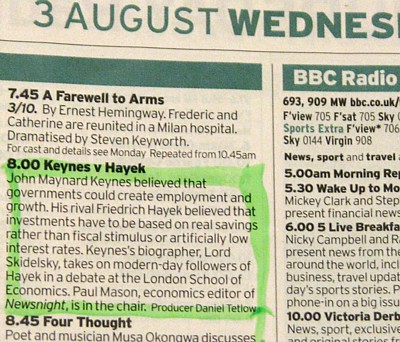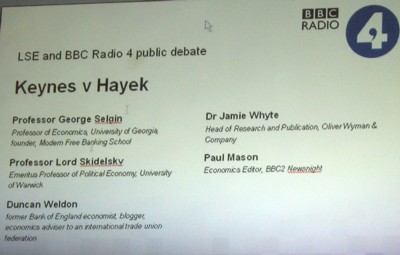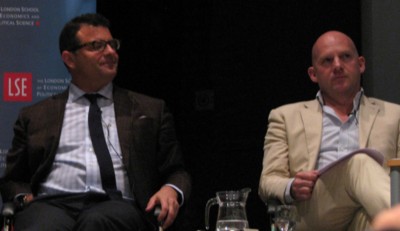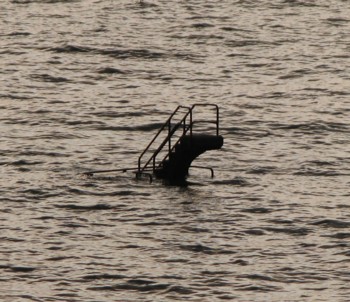We are developing the social individualist meta-context for the future. From the very serious to the extremely frivolous... lets see what is on the mind of the Samizdata people.
Samizdata, derived from Samizdat /n. - a system of clandestine publication of banned literature in the USSR [Russ.,= self-publishing house]
|
When you read this kind of thing in a newspaper, it’s bad. But when you read it at cricinfo …:
The riots and looting in Birmingham were copycat incidents following events in London over the previous days. The vandalism was concentrated around the city centre, with masked young men and women going on a rampage from early evening, looting shops and destroying property.
They started by snatching mobile phones and handbags from pedestrians, followed by kicking, punching, breaking windows of shopping centres, banks, pubs, restaurants, forcing people to shut down these establishments. Groups of two or three suddenly grew larger and created an atmosphere of panic and fear. Through the evening and night riot police were on the main streets, armoured police vehicles and other cars scanned the roads, and a helicoper hovered overhead.
The headline above this says: “Test likely to begin despite riots”.
One of the more depressing things about these riots is the way that the only thing that the Police can think of to say to us non-looters and non-arsonists is: “Don’t join in” and “Let us handle it”. If the bad guys start to torch your house, let them get on with it. If they attack your next door neighbour, don’t join in on his side. Run away. Let the barbarians occupy and trash whatever territory they pick on and steal or destroy whatever property they want to.
There was a fascinating impromptu TV interview with some young citizens of Clapham last night, not “experts”, just regular citizens, one of whom stated the opposite policy. Law abiding persons should get out of their houses, he said, en masse, and be ready to defend them.
The trouble with “letting the Police do their job” is that in the precise spot in which you happen to live, or used to live, their job probably won’t start, if it ever does start, for about a week. In the meantime, letting the Police do their job means letting the damn looters and arsonists do their job, without anyone laying a finger on them, laying a finger on them being illegal. This is a doomed policy. If most people are compelled by law to be only neutral bystanders in a war between themselves and barbarism, barbarism wins. The right to, at the very least, forceful self defence must now be insisted upon. The Police, as we advocates of the don’t-disarm-the-victims-of-crime policy have been pointing out for decades, can’t be everywhere. They cannot instantaneously attend every crime, and magically prevent it. Only the potential or actual victims of crime can sometimes immediately prevent or immediately punish crime, provided only that they are not forbidden to.
Says Instapundit:
Unlike L.A., there are no Korean shopkeepers with AR-15s to help contain the looting.
Precisely.
The best thing about these riots is that they have distilled and aggregated the folly of the “let the Police see to it” policy into a large and combined event, and they have done it right next door to where our political class lives. These riots are not confined to Birmingham, or some such second-tier city. They are happening in the backyard of our rulers, even as they hurry back home from Tuscany.
For the last few decades the don’t-get-involved, let-Them-handle-it policy has applied only to more isolated crimes, or to riots only way beyond our capital city, which has meant that its doomed nature has impacted only upon those individuals or local populations attacked by criminals, not on the nation as a whole as perceived and lived in by those ruling it. Now our rulers can see this policy in vividly dramatic “action” (i.e. inaction), live on TV, and near enough to where they live for them to be scared, along with everyone else. And the rest of us will see them turning into the kind of vengeful right wing monsters they despise, as soon as their own houses are attacked. Which they well might be.
I recall reading about a yob who stole something from a street stall in Nigeria, many years ago. He was promptly set upon by a mob, of stallholders and their customers, and beaten up. Are you civilised? It depends which side your mobs are on. All our mobs, except the little mobs that are the Police, are anti-civilisation.
I own a cricket bat, inherited from my late Uncle Guy (whom I wrote about towards the end of this ancient blog posting), with “G Micklethwait” written on it. I hope I don’t find myself thinking about using it during the next few days, but I have already checked where it is.
These riots could be Cameron’s Falklands War. That’s what just occurred to me, as I was watching my television, as the arson and rioting spreads throughout London and beyond.
Some man on the telly – I don’t know who or what he was – has just said, very uneloquently, that we are about to learn what David Cameron is made of. His decision concerning when to come home from his holiday (arguably he left it far too late), in Tuscany, will pale into insignificance beside the decisions that he will have to make in the course of the next few days.
Enoch Powell said something very similar of a previous Prime Minister, a great deal more memorably, at the time of that earlier war. You can read here what Powell then said, if you scroll down to the bottom of the page:
“The Prime Minister, shortly after she came into office, received a soubriquet as the ‘Iron Lady’. It arose in the context of remarks which she made about defence against the Soviet Union and its allies; but there was no reason to suppose that the Right Hon. Lady did not welcome and, indeed, take pride in that description. In the next week or two this House, the nation and the Right Hon. Lady herself will learn of what metal she is made.”
Nobody has ever made any such observation about David Cameron, or not in my hearing, but a similar examination of him is now about to occur.
It could actually be the making of the man. But then again, …
Alas, this kind of thing is the Health of the State.
LATER:
Labour politicians and spokespersons are out in force, if only to make it clear that they too are against it all. Smart move. The trick in these situations is to blame your political opponents, but without seeming to blame your political opponents.
Kevin McGuire, a journalist close to the previous political regime, has just said something rather more memorable:
“If he comes back from holiday, and it makes no difference, what’s the point of having a Prime Minister?”
In other words, if he makes no difference, we should have a different Prime Minister. As indeed we should. Nicely put.
I see that some Democrat politicians in the USA have taken to calling Tea Party politicians terrorists.
I wonder if this is wise on their part. It is clearly wrong and nasty; that’s a given. What I now wonder is whether such insults will be politically damaging to the Tea Party, or rather to any politician who uses such wrong and nasty language. Is this some kind of concerted effort by Democrat bigmouths to badmouth the Tea Party? Or are they just very angry, and individually blowing off steam? Being the optimist I am, I suspect the latter, or that if it is more the former, it may be a serious miscalculation.
Recently, in a comment here (I apologise for forgetting to which posting this comment was attached and for being unable to supply the link that the commenter did supply – perhaps he or some other commenter can rectify that and I will be able to add the link (by turning those last two words blue)) to a theory that once a “convinced minority” (I think that was the phrase) reaches about ten per cent of the population, its success from that moment on cascades, and soon part or even all of the agenda that this minority is pushing becomes a given of conventional discussion and debate. (I presume that this book was involved.)
This makes a lot of sense to me. I think the key to such transformations of opinion or behaviour are that individual members of the population, even though mostly not themselves already members of the convinced minority in question, are almost all of them quite closely connected to people who are.
The Tea Party, for the purposes of such analysis as this, doesn’t just mean all the good (I think) people who are spending every spare hour and spare dime they have forcing, by impeccably democratic methods, Tea Party opinions upon that great and greedy bi-partisan tribe of Washington tax-and-spenders. I include also the (much(?) greater) group of people who, when they hear a Tea Party opinion about government spending, government debt and so on, nod their heads and say: “Yeah that’s right. They may be … (insert insult of choice involving religion, science, abortion, witchcraft, guns, four-wheel-drive vehicles, etc.) … but these people are right about government spending. It’s too much. It’s got to be controlled.”
And, I’m guessing, a lot of Americans now know people like that. A lot are even related to such people. They may not agree with such sentiments themselves, but they know, and like, maybe even love, people who do now believe such things. So, when some Democrat politician calls a Tea Party politician a terrorist, a great many average Americans respond, not by making a note to not join the Tea Party and to agree about how mad they are when next they come up in conversation, but rather, by reacting with a thought like: “Hey, that’s my Uncle Freddy you’re talking about! He likes those Tea Party people. He may be a bit of an old grump, but he ain’t no terrorist sympathiser. He drove a truck in Gulf War 1. Last Christmas he bought me an iPhone. He’s okay. Take it back!”
To put the above story another way, the key to all this is that once the population as a whole starts to have its own personal face-to-face take on what it thinks about that convinced minority with its previously off-the-chart-of-respectability opinions, no amount of political and media insults can change how they see things. They now have their own personal versions of the story, and they ain’t going to be told what to think by a mere politician on TV.
If that’s right, and if all this convinced minority stuff does now apply to the Tea Party, then bigmouth Democrats calling their Tea Party enemies “terrorists” is cause not for fear, but for rejoicing, among all those of us who want the finances of the US government to be something vaguely like sane in the years to come. Such insults are not evidence of an argument being or about to be won by such Dems; it is evidence that they are at least beginning seriously to lose this argument, and that they are starting to realise this. They know that a great many people will feel personally insulted by all this terrorist talk, but, … Grrrrrrrr!!!! What the hell is happening to the world, when a politician can’t spend other people’s money any damn way he likes? Screw the damn world!!! Screw you all, you bastards!!! When Dems call Tea Partiers terrorists, they are being honest, in the sense that they are truly saying what is on their angry, confused, wrong, nasty minds.
Does the above make any sense? It does to me. Or am I being, as I so often am, too optimistic?
By the way, while typing in this posting (on an unfamiliar computer) I noticed that I had at one point put the “Teat” Party. But actually, I quite like that phrase, to describe all the kind of people who think that Tea Partiers really are terrorists.
Tonight,BBC Radio 4, 8pm:
I’m told that it will sound a lot more coherent than it did on the night it was recorded.
More pre-publicity from the BBC here.
At lunchtime yesterday, the BBC’s Test Match Special radio commentators held a most entertaining Q&A with former top cricket umpire John Holder, who was asked questions like: “If a batsman hits the ball, it hits the batsman at the other end, bounces off the teeth of the bowler onto the wicket and the stricken batsman is still out of his ground, is that batsman run out?” (yes); or: “If the batsman hits the ball into the air, and a bag blows across the ground and the ball goes into the bag, and a fielder catches hold of the bag before anything hits the ground, is the batsman out?” (yes again). “If the batsman hits the ball and it strikes the branches of a tree …?” “If a dog gets on the pitch …?” “If a passing bird of prey catches the ball …?” You get the idea. Ho ho, chuckle chuckle. Holder answered everything with utter confidence. Not once could anyone, as the cricket metaphor goes, stump him.
But, about two hours later, right at the very end of the immediately following session of test cricket between England and India, at Trent Bridge Nottingham, a question of just this complicated kind arose for real.
If a batsman hits the ball towards the boundary, and if the fielder stops the ball going to the boundary, but thinks he failed to stop it, and if the fielder then picks the ball up in a relaxed, casual manner, for all the world making it clear that he thinks it was a four, and if the fielders in the middle of the pitch receive the ball in the manner of people who also think that the ball went for four, but if then, as an afterthought, one of the fielders takes the ball and flicks off the bails, with no sense of celebration, just on the off chance, because the umpires haven’t signalled a four, or said that it’s now tea time, but nevertheless, one of the England batsmen has already concluded that it is tea time, and is walking off the pitch, and is thus out of his ground, the fielder who has removed the bails having appealed in a quietly interrogative rather than exultant manner … is the batsman out? That’s what happened, for real. The umpires asked the Indian captain, Mahendra Singh Dhoni, whether he was withdrawing his appeal. No, said Dhoni. Out, said the umpires. Ian Bell run out 137, off the last ball before tea. Bell bewildered and angry. The England team, and the crowd … not happy.
 Where, the commentators were all saying to one another during their frantic tea interval attempts to explain it all to us listeners, is John Holder when you need him?
But meanwhile, the two Andrews, Flower and Strauss, coach and captain of England, dropped by the Indian dressing room and asked the Indian team if they would withdraw their appeal, and India did. Boos turned to cheers and applause when the umpires (boo!), the Indian team (boo!!), and then … Ian Bell all emerged from the pavilion after the tea break. Hurrah!!!
We now live in an age when all sports fans and all players come to that, rather than just the official salaried commentators and newspaper hacks, can immediately say what is on their (our) minds. This fact may not yet have had very much impact on global politics, the banking system, etc., but it has already changed the atmosphere that surrounds international sport.
So who do I think was right? Were the Indians gents, or suckers? Spirit of the game, or letter of the law? → Continue reading: The run out that wasn’t
Ideas matter, and especially to intellectuals like President Obama. He is not a rigid ideologue and is capable of flexible maneuvering. But his interpretation of history, his attitude toward sovereignty, and his confidence in multilateral institutions have shaped his views of American power and of American leadership in ways that distinguish him from previous presidents. On Libya, his deference to the UN Security Council and refusal to serve as coalition leader show that he cares more about restraining America than about accomplishing any particular result in Libya. He views Libya and the whole Arab Spring as relatively small distractions from his broader strategy for breaking with the history of U.S. foreign policy as it developed in the last century. The critics who accuse Obama of being adrift in foreign policy are mistaken. He has clear ideas of where he wants to go. The problem for him is that, if his strategy is set forth plainly, most Americans will not want to follow him.
– The Obama Doctrine Defined by Douglas J. Feith and Seth Cropsey
There is a great piece up at Cricinfo in which Suresh Menon remembers cricket dramas past, and reflects on how memory plays tricks.
Particularly fascinating was this, about this match played at Old Trafford in 1936:
India’s captain the Maharajkumar of Vizianagram (the only active cricketer to be knighted, we must remember, although it was not for services to cricket – he didn’t serve cricket till he gave it up altogether as player, captain, selector and broadcaster) called his opening batsman Mushtaq Ali aside for last-minute instructions. Vizzy had been worried about the growing stature of Vijay Merchant, and instructed Mushtaq to run him out. Mushtaq told Merchant, they had a good laugh, and put on 203 for the first wicket.
What a selfish, self-important bastard, and what a great punishment. I’m guessing that the Maharajkumar of Vizianagram was totally bought and paid for by the British (hence the knighthood), and that when Mushtaq and Merchant disobeyed him they felt that they were also defying the very Empire itself. You can see from the scorecard that “Vizzy” batted at number nine, scoring a grand total of six runs, and did not bowl, even though seven other Indians did. Talk about a non-playing captain.
What a joy for cricket fans like me that India used cricket to defy Britain, rather than defying Britain by dumping cricket and taking up – I don’t know – baseball, or something similar.
More Indian anti-Imperial defiance is reported here (my thanks to Antoine Clarke for the link). I think it’s a sign of how strong the Indian presence in the world generally now is that people feel relaxed about taking the piss out of Indians, and out of the non-Indians who now grovel to Indians. We couldn’t comfortably do that when Indians were nothing but the Starving Millions, and when, cricket-wise, they were mostly Ghandi clones who could only bowl slow and bat slow and play for draws.
I have been following the current England India cricket series with fascinated delight. This already feels like the best series here since 2005, which it will definitely be if the Indians come back hard, as is their recent habit, after their poor first test at Lord’s. At Lord’s, legendary Indian batsmen like V.V.S. Laxman and Sachin Tendulkar looked a bit like ancient monuments rather than current threats. Tendulkar’s mere participation in the game turned its last day from a fine occasion into a great one, but his actual batting was a disappointment. Of the three surviving members of the Big Four (the now retired Saurav Ganguly being the other), only Rahul Dravid made his presence truly felt. But Tendulkar is not old, he was merely ill. And if he in particular does some great things in the later games, what a series this could be.
By the way, I have been getting it wrong about England being already ranked number two in the test match rankings. Now that I have actually consulted the relevant website, I see that England are only at three, behind South Africa (India being top). My apologies. But, England will go to at least two if they beat India in the current series, and they will indeed go top if they beat India by a clear two games. That last bit, I definitely got right.
Game two starts tomorrow.
I see that, no doubt under the influence of the same editorial prodding as I received this afternoon, Johnathan Pearce has already done a posting here (see below) about the debate last night (also attended by John Phelan) at the London School of Economics. What I have to say is really just an expanded version of what Johnathan Pearce has already said, but I’ll say it anyway, partly because I do have one distinct advantage over him in this matter. Unlike Johnathan but like John Phelan, I was actually there.
I took photos, including one that does quite a bit of further event describing, which saves me having to:
Click to make that more legible.
Here are the two bad guys, Skidelsky and Weldon:
And here are the two guys on our side, Selgin and Whyte:
Click on the good guys to get them bigger. (The bad guys are quite big enough already.) As you can probably deduce from my pictures, the lighting on the stage was what you might call excellent for radio.
As for what was said, my overriding impression was that the Hayekians won, but not in quite the sense that John Phelan means when he says that they won, i.e. (a) that the Hayekians were more numerous and shouted louder and (b) that the Hayekians included John Phelan. They were, they did and they do. The “Hayekians” included me as well, for whatever difference that makes to anything. No, this was a more significant victory for Austrianism in the broader sense than merely that some Keynesians were, in the opinion of one of the anti-Keynesians who attended, out-argued on the radio. The really important point is that Austrianism is being put up there beside the broadly Keynesian macro-economics orthodoxy, as the alternative. The alternative.
I recall in my youth reading a book by someone called Robert Townsend. Townsend was the boss of a car hire company called Avis, and it was on his watch that a go-ahead new advertising agency (a bit like the ones in Mad Men), urged on and applauded by Townsend and his underlings, coined the Avis advertising slogan: “We’re Number Two and We Try Harder”. Number One being the car rental company Hertz.
The point of the slogan wasn’t that it caused very much immediate hurt to Hertz. On the contrary, it acknowledged Hertz as Number One, which got everyone’s attention. Who are these guys calling themselves Number Two? Wow. The regular advertising thing in those days would have been for Number Two to scratch around until it had found some more or less implausible excuse to call itself Number One. Most of the hurts (pardon the pun) unleashed by this slogan were inflicted upon car hire companies Number Three, Four, Five and the rest of them. What the slogan about Avis being Number Two but trying harder did was separate Avis from the huge pack of “other” car hire companies. It turned Avis from nothing into Pepsi-Cola, you might say. Hertz continued to be Coke (whether Coke itself is still Coke is another argument), but Avis itself lept ahead, patronised by anyone who fancied trying a try-harder, less smug alternative to Hertz. The others, who were presumably trying just as hard as Avis, fell away.
That, I believe, is the significance of events like that debate last night. It puts Austrianism on the map as the “other” way of looking at all that financial turmoil we’ve been having lately. No Keynesians present at this debate will have been very discomforted by anything that was said during it. They had their guys up there on the platform and they clapped and laughed and cheered when their guys spoke with any eloquence, just as we (John Phelan, I and the rest of our team in the audience) clapped when our guys waxed eloquent.
For you see, this was a classic BBC event. Built into the DNA of the BBC is that in order to “do” anything that is opinion rather than mere news, you have to argue about it, and to argue about it, you have to have two sides. Not three sides or five sides. Two.
And the big trick, if you aren’t Number One in a BBC debate is somehow to wangle yourself the Number Two spot, and what’s more to get that spot entirely for your team. Austrianism, judging by last night’s show, is well on the way to accomplishing precisely that status. And this despite, as Lord Skidelsky himself quite rightly said, having a numerically tiny academic presence compared to the (approximately speaking) Keynesian orthodoxy.
The big point here is not, e.g., whether Lord Skidelsky said nice things about how the Chinese government goes about its Keynesian business (although he did), or whether Selgin spoke eloquently (he did in my biased opinion, eventually, and despite his rather comical reliance on waving minute and totally illegible graphs around, which don’t exactly go over a storm on the radio, as everyone except him seemed to realise). The point is that this debate was “Keynes v Hayek”, rather than “Keynes and his critics”. The speakers were two Keynesians and two Hayekians, rather than merely two Keynesians and then a pathetic queue of anti-Keynesian pygmies of about ten different varieties (several of them complaining that the Keynesian headliner acts weren’t being Keynesian enough) taking it in turns to be humiliated.
I agree with Phelan that Skidelsky’s open admiration for Chinese “investment” in “infrastructure”, in answer to a question about China from the floor (and huge kudos to whoever it was who asked it), was both an illustration of the inherently bossy nature of Keynesianism, just as Hayek said, and that this might have been seized on more eagerly by Whyte or Selgin than it was, which was hardly at all. Skidelsky’s answer was also a horrendous hostage to fortune. If Chinese infrastructure “investment” in recent years becomes famous for being as wasteful as some here already suspect, Skidelsky should be reminded of this pronouncement.
Speaking very much for myself, I was delighted when Skidelsky spelt out, with admirable clarity, that we Austrianists believe that President Roosevelt prolonged the Great Depression. At this point I shouted out words to effect of “quite right” and “he did”. Skidelsky then said, glancing contemptuously in the general direction of my heckling, that anyone who thought that was living in cloud cuckoo land. Fine. He was on the platform and was entitled to the last word on the matter. On the night.
The point being not to win arguments like this, but to have them, to let everyone listening know that, when it comes to things like whether Roosevelt had a good Great Depression or a bad Great Depression, there is an argument.
When it turns out (this was not really talked about last night) that actually, far from having calmed down, our new version of the Great Depression is still at the you-ain’t-seen-nothin’-yet stage, arguments like that one in particular about Roosevelt making the Great Depression worse, and in general about Keynes versus Hayek, could result in the Number One team in this bunfight being deposed. Guess who I think might – just might – be invited to step forward to replace that Number One team. I agree with Johnathan Pearce that “wallowing in despair” (see below) is, in times like these, a cop-out.
A final point, concerning the BBC master of ceremonies, Paul Mason. Mason had a lot to contend with, what with urging speakers to cool it with the paper flapping, organising the re-recording of bits when microphones fell off or when there was a big noise interrupting things or when the audience wasn’t quiet enough during the first attempt at a re-run, or when he himself had some intros to do but fluffed his lines, for instance by giggling. Also, from time to time, it was Mason’s rather undignified duty to get us all to yell either “Yo Keynes!” or “Yo Hayek!”, according to taste. Nevertheless, in among all that, I got the distinct impression that, if not actually on our side, Paul Mason is highly sympathetic to the case that the Hayek team were making. At the very least, he has taken the time to become thoroughly acquainted with what that case is.
An edited version of all this intellectual mud-slinging will be broadcast by Radio Four on August 3rd.
See also the latest Keynes v Hayek rap video. They played that at the beginning, to get everyone in the mood. Genius. If you want to know why I think it’s genius, you must be one of those people who skips to the end of blog postings without actually reading them. Which is fine, but: see all of the above.
Given enough time, the primary function of any bureaucracy becomes the employment of its employees.
– Daniel Hannan ruminates on the gap between what people think that NGOs do, and what NGOs do.
A few days ago, I mentioned that England were 127 for 2 at the end of the first day of the first (five day) test match (I’m talking cricket – again) between England and India (numbers two and one respectively in the test match rankings), at Lord’s, the world’s most famous cricket ground. Now we approach lunch on the final day, and it has become a truly fantastic occasion. Even the weather has obliged. Earlier in the game, the weather was threatening to spoil the end of the game, but on Saturday the forecasts turned good for the duration, and so it has proved.
The reason I keep going on about how important it is that India and England are numbers one and two in the test match rankings is that, well, it is important. In the matter of the test match ranking system, here is one of those delicious times when I can confidently say: I told you so. Nobody else in the world will remember this, but I do. The test ranking system gives this series a whole extra dimension. This is especially the case now that Australia are past their McGrath/Warne peak (McGrath was a great bowler and Warne was a transcendentally great bowler), which meant that the recent Ashes series in Australia had the feel of something that Australia had lost by getting worse rather than that England had won by getting better.
India are now trying to save the game on the final day, but lost two important top order wickets just before lunch, and at lunch are now 142 for 4. If and when they lose ten wickets, that’s it, England win, which they will be desperate to do, having got into this winning position. The Indians will get better as the series goes on and as they get used to English conditions, because they always do. They have got better during this game. In the first England innings, the top Indian bowler Zaheer Khan picked up an injury and is probably out of the series, and the other bowlers were poor. But in the second innings, the other Indian bowlers found their form and had England struggling to add to their huge first innings lead. But Zaheer’s absence told in the end, because well as they had bowled in the morning, the also-rans got tired, and England built a big stand and were able to declare, setting India an impossible target. Last night, India made a determined start, but did lose one wicket.
The great Sachin Tendulkar is now at the crease, and everyone wants him to get a hundred, because that would be his hundredth hundred in international (i.e. test and one day together) cricket. What a day that would make it. England supporters want Tendulkar to get a hundred but England to win despite that. Indian supporters, lots of whom are present at the ground, want Tendulkar to get a hundred and for India to save the game, and if India do save the game it will feel like a win for them.
One of the frustrating things about cricket is how great finishes often attract such small crowds. This is because fans like to plan their attendance at cricket matches and you just cannot rely on the end of a test match being very interesting. It might end in a tame draw. Worse, what with the one-day-cricket-influenced attacking habits of modern batsmen, the game is all too likely to have ended on day four or even day three. So it is that the final day of a test match, if the game lasts that long, can either be a horrible anti-climax watched by almost nobody, or a great opportunity for non-regular cricket fans to turn up on the final morning and get in for a knock down price, to watch a great day of cricket. This game is a fine example of the second sort of game, although those who got in this way today had to queue very early. If you turned up a mere half an hour before the start of play, you would have had no chance. I toyed with the notion of doing exactly that, and just as well I didn’t bother.
The most bizarre kind of last day happens when it looks certain to be a draw, everybody buggers off home, nobody else local gives the game the time of day, and then it suddenly springs to life when the batting side that thought they were relaxedly batting out time suddenly loses a huge clatter of wickets and loses. This was exactly what happened when England, much to everyone’s amazement, beat Sri Lanka earlier this year in Cardiff, watched by, approximately speaking, two Welshmen and a Welsh sheepdog. I had a bath that afternoon. When I got into the bath, Sri Lanka had one wicket down. By the time I got out of my bath they were about eight down. Something like that. Like I say, bizarre. What the hell kind of game stages a great finish like that, which nobody is there to see? It’s circumstances like that, perhaps even more than the boring draws, that have people saying that test cricket is doomed.
But test cricket has been doomed for as long as I can remember. During great five day cricketing contests like this one between England and India (or during a great series like the one here against Australia in 2005), you find yourself saying: every game should be this doomed. They’re now back playing. I just had an incoming phone call and missed it, but apparently Tendulkar has just had an LBW escape, LBW being, minus all the refinements, when it hits your padded legs and would have hit the stumps, which would mean you are out. The umpire gave him not out. LBW machines, which the Indians have vetoed for this series, would have given him out. Tense. Very tense. Tendulkar stuck on eleven, but still there.
I suspect that the illness which had him off the field yesterday may still be affecting him. I suspect he’s not quite himself. All over the world, people like me are listening in on the radio, and they’re reading out emails from such people, the latest one being from a lady in Switzerland saying she hopes (reprise) that Tendulkar gets a hundred but England win. Michael J tells me that Australians aren’t so fond of Tendulkar, because of his habit of skipping the more irksome foreign tours, like the one the Indians did in the West Indies, just before coming here.
But … Tendulkar out!!! LBW (see above) to James Anderson, who has now taken three wickets. Glad I don’t now have to explain that. I promise you I put in that bit about Tendulkar not being at his best before he got out.
Later: India still resisting hard, past 200, still only for 5. India’s captain, the redoubtable Mahendra Singh Dhoni is now batting. The second new ball (new balls do more in the air and are more threatening to batsmen) will probably decide this thing. It’s due in four overs (i.e. twenty four more deliveries). If England don’t then get wickets …
What a game. Am I talking about cricket itself, or merely this game? Both.
LATER: No Tendulkar century, but England win by 196 runs.
The easy part is taking all the photos. The slightly harder part is knowing which are worth foisting on other people, not least because foisting is more complicated than taking. Anyway, I hope you enjoy these Brittany holiday snaps which I took a couple of months ago and have now picked out as worth exhibiting here.
My usual Brittany airport destination has been Brest, quite close to where the friends whom I regularly visit live, in Quimper. But, probably because of the new and very obviously architect-designed buildings, all plate glass and shiny metal at peculiar angles, that have been constructed at Brest airport, Ryanair no longer sends its 737s from Stansted to Brest. It either costs them too much or it takes them too long to turn their planes around, or some combination of the two. Ryanair prefers its airports to be not very glorified sheds.
So instead I arrived in Brittany at Dinard, near the coastal town of St Malo. And when my friend came by car from the other end of Brittany to collect me, it made sense for us to have a wander around St Malo, which has a particularly fine smaller and older version of itself, right next to the sea, with a wall around it that you can walk on top of.
On the evening of my arrival I observed this:
What could it be? A wreck perhaps? Odd.
A week later, in the course of my return home, we visited St Malo again, and once again took a stroll around the old town walls. The tide, having been in when I arrived, was out, and all was revealed:
It’s a swimming pool, refreshed and replenished every time the tide comes in. Which makes a lot of sense. When the tide goes out in that particular part of coastal France, it goes out a long way, and wherever the sea is, my guess is that the currents in it can play evil tricks, what with the tides having such a long way to travel, and through such complicated places. How much nicer to wait for the tide to be out, and to take a swim in a nice safe pool, as this person obligingly proved for me.
Now here are a couple snaps of images done by other people, both timeless and universal in their different ways. First, an advertisement, on a bus shelter:
I don’t think I need comment on that, other than to say that I haven’t seen this particular advert in England. Which proves … I don’t know what.
Second, another universal set of circumstances:
Not very well photoed by me, for which apologies, through a shiny shop window. Had I been a cleverer photoshopper, I might have been able to straighten that out, but you surely get the picture, and clicking on it makes it that bit clearer, as with all of these snaps.
A sheep in the middle is saying “Excuse me, excuse me, excuse me”, to get to the precipice quicker.
Again, I’ll let readers draw their own conclusions about what particular contemporary circumstance is being portrayed. Euro purchasers perhaps? You decide.
Finally, a surfer, photoed through rain:
This was taken at something called the Baie des Trépassés, which does not mean the Bay of the Very Out of Date. Trépassés means people who have trespassed as in “crossed over”, in other words people who are dead. The very same complicated coastal currents which caused anyone drowned at sea anywhere near it to wash up at the Baie des Trépassés (hence the name) now cause the waves in the Baie des Trépassés to be bigger than in any nearby places, hence the surfers. Of the many intriguing places I have visited in Brittany, this was the weirdest. The vile weather when I saw this place only added to the weirdness.
A reminder, the problem isn’t the debt ceiling – it’s the debt, …
– Rand Simberg
|
Who Are We? The Samizdata people are a bunch of sinister and heavily armed globalist illuminati who seek to infect the entire world with the values of personal liberty and several property. Amongst our many crimes is a sense of humour and the intermittent use of British spelling.
We are also a varied group made up of social individualists, classical liberals, whigs, libertarians, extropians, futurists, ‘Porcupines’, Karl Popper fetishists, recovering neo-conservatives, crazed Ayn Rand worshipers, over-caffeinated Virginia Postrel devotees, witty Frédéric Bastiat wannabes, cypherpunks, minarchists, kritarchists and wild-eyed anarcho-capitalists from Britain, North America, Australia and Europe.
|
















